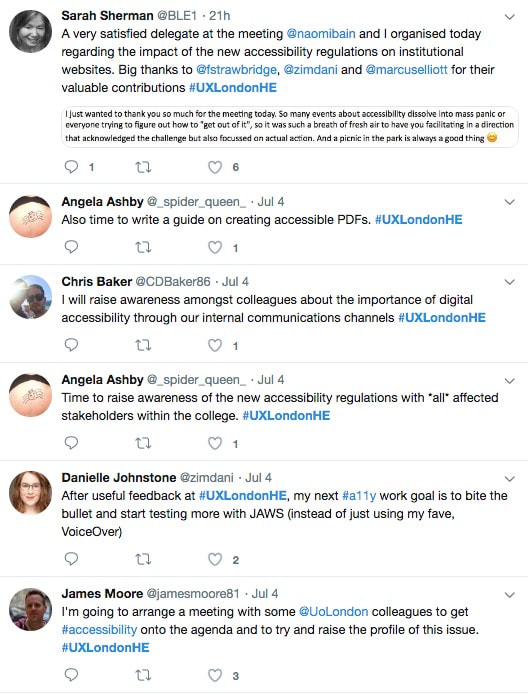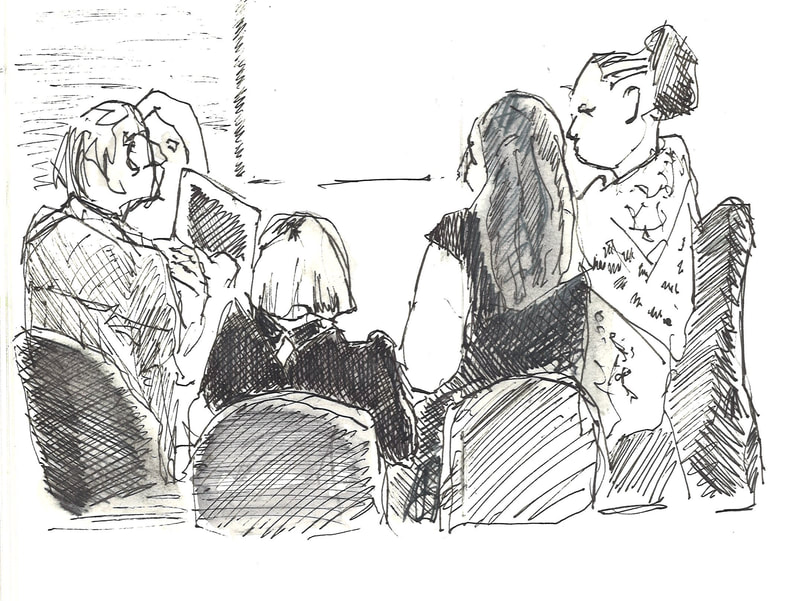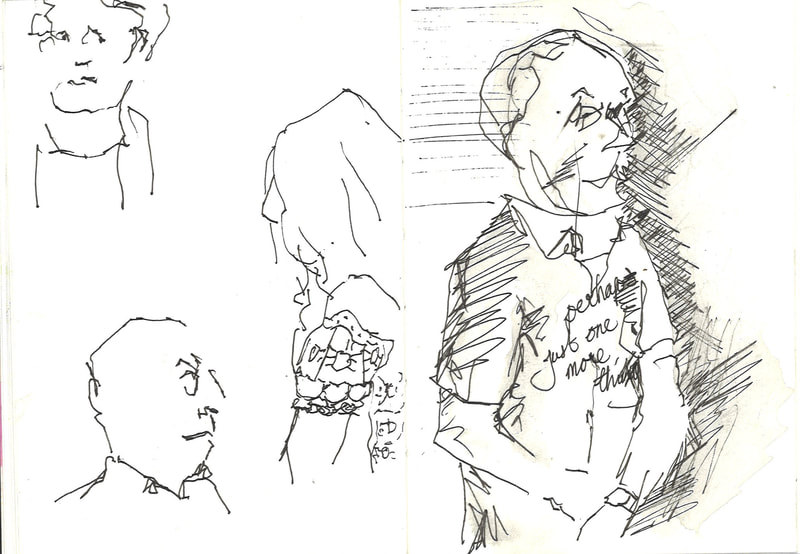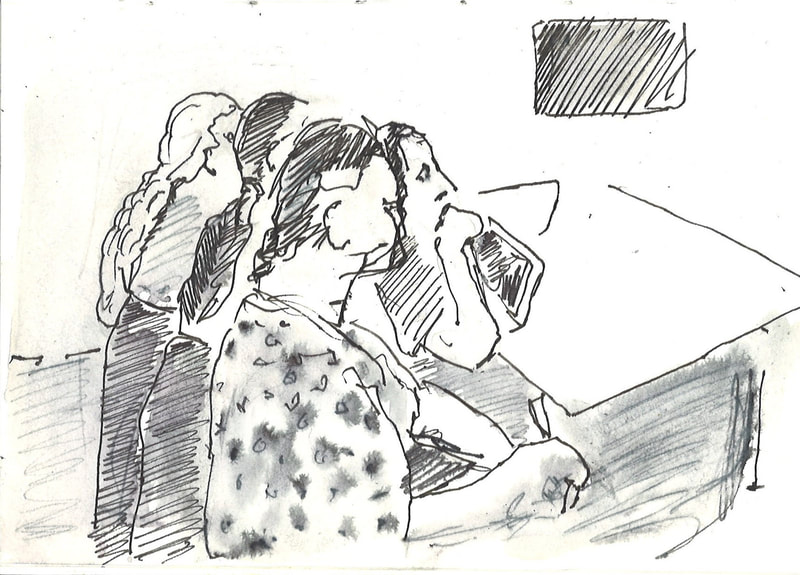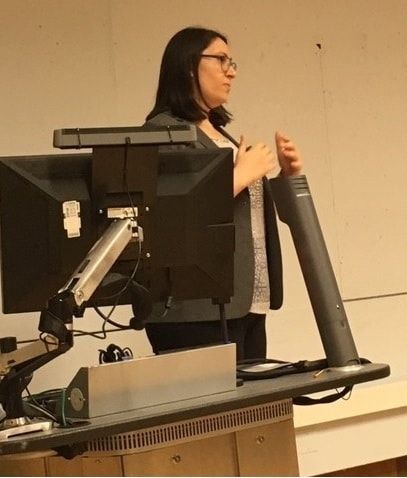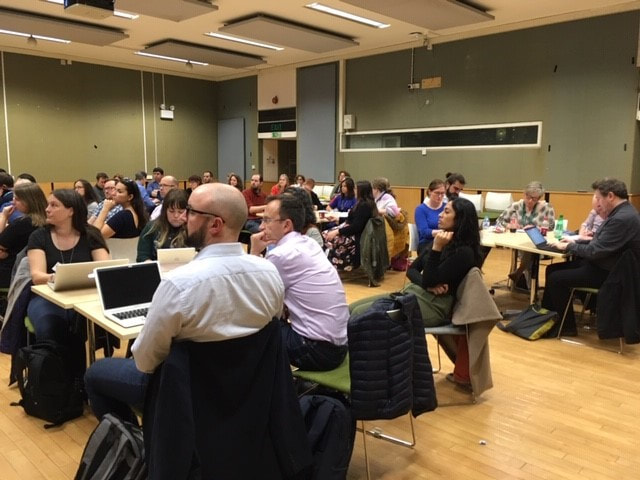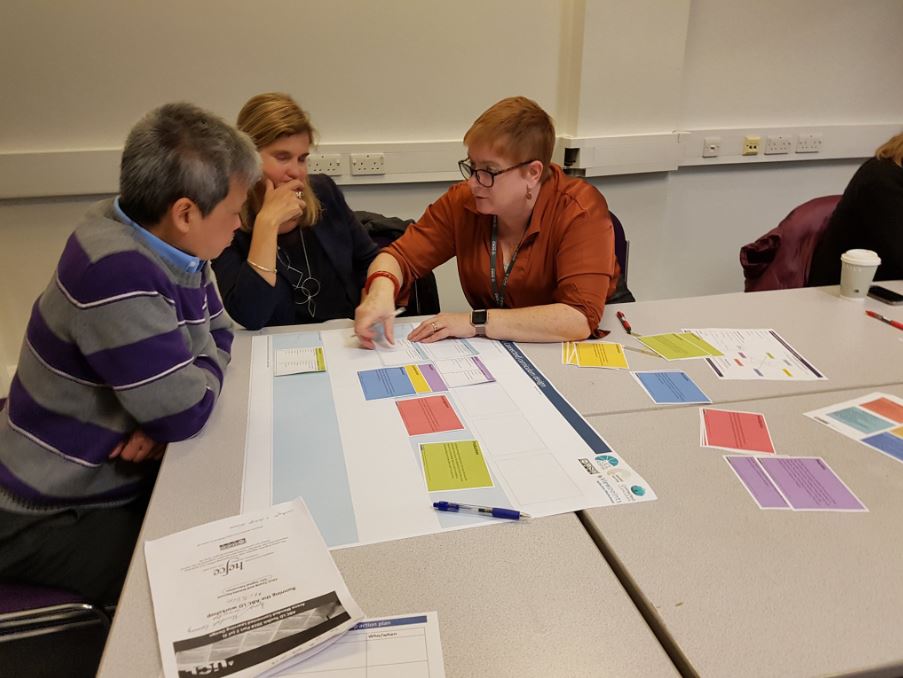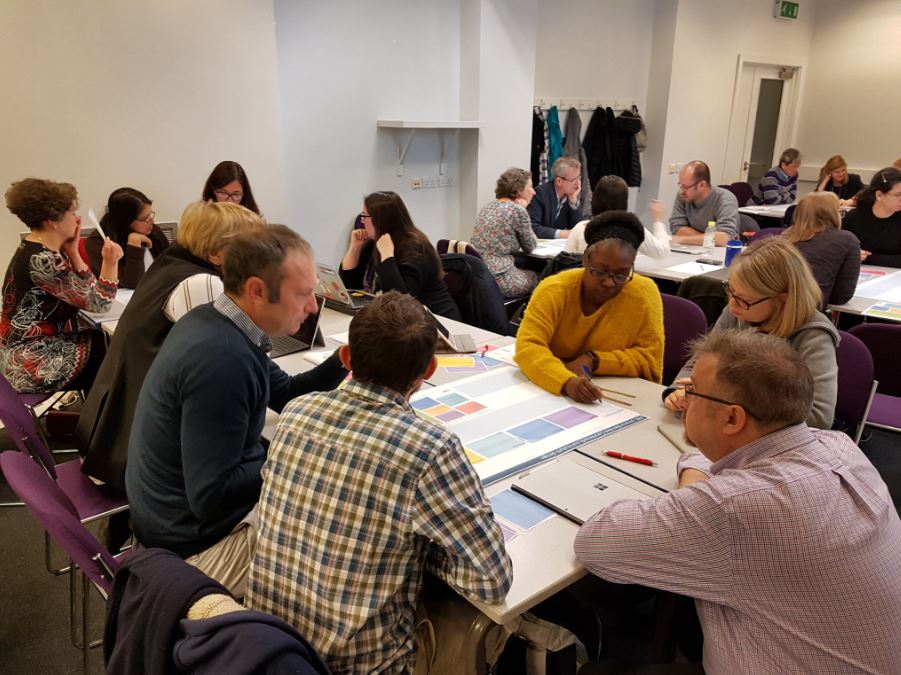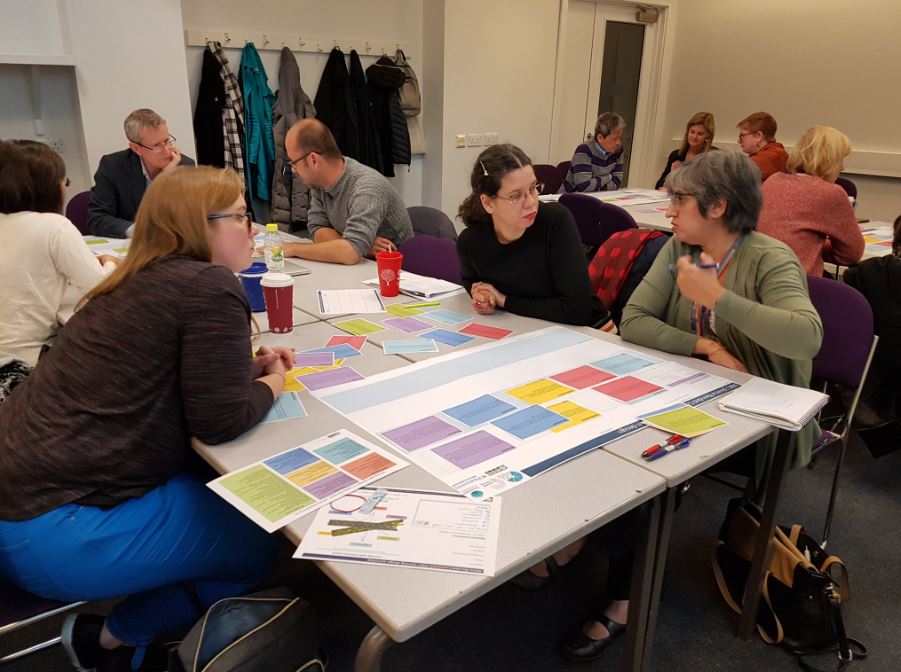Past Events
2021-22
Academic Integrity: it’s everyone’s responsibility
A workshop to share practice around identifying and preventing plagiarism
27th June 2022
We all have a role to play in the assessment process. Whether you’re an academic setting an assignment, a PhD student marking scripts, a course administrator supporting the VLE, a learning technologist maintaining the Turnitin plugin, a student records manager or exams officer, etc, etc. The BLE’s Academic Study Skills for Student’s Group organised this workshop to allow colleagues to share examples from their own experiences, and to find out how other institutions are managing and supporting academic integrity by seeking to prevent plagiarism. Over 70 colleagues from the BLE partner institutions joined us for this lively, online event.
A workshop to share practice around identifying and preventing plagiarism
27th June 2022
We all have a role to play in the assessment process. Whether you’re an academic setting an assignment, a PhD student marking scripts, a course administrator supporting the VLE, a learning technologist maintaining the Turnitin plugin, a student records manager or exams officer, etc, etc. The BLE’s Academic Study Skills for Student’s Group organised this workshop to allow colleagues to share examples from their own experiences, and to find out how other institutions are managing and supporting academic integrity by seeking to prevent plagiarism. Over 70 colleagues from the BLE partner institutions joined us for this lively, online event.
Presentations:
| Plagiarism: the student perspective, Katie Banks, Academic Skills Tutor · City, University of London | |
| File Size: | 234 kb |
| File Type: | pptx |
| Case study: Plagiarism at departmental level: Germaine Symons, Learning Support Officer, Birkbeck | |
| File Size: | 1208 kb |
| File Type: | pptx |
BLESS meeting: Fair Dealing
24th February 2022
This special BLESS* Group meeting was a wonderfully informative and lively session focusing on what fair dealing means in practice in our context of Higher Education. Huge thanks to our fantastic speakers, Jane Secker (City) and Chris Morrison (Kent), who set the scene so perfectly for us; their slides are attached. This was followed by a lively panel discussion, chaired by Elizabeth Charles (Birkbeck) with Jane, Chris and additional panelists, Sam Ahern (UCL) and Stephen Penton (City). We also thank all the participants whose contributions resulted in a rich, valuable and energetic session.
24th February 2022
This special BLESS* Group meeting was a wonderfully informative and lively session focusing on what fair dealing means in practice in our context of Higher Education. Huge thanks to our fantastic speakers, Jane Secker (City) and Chris Morrison (Kent), who set the scene so perfectly for us; their slides are attached. This was followed by a lively panel discussion, chaired by Elizabeth Charles (Birkbeck) with Jane, Chris and additional panelists, Sam Ahern (UCL) and Stephen Penton (City). We also thank all the participants whose contributions resulted in a rich, valuable and energetic session.
| Introductory slides | |
| File Size: | 1562 kb |
| File Type: | |
*BLESS Group
The Bloomsbury Library e-Systems & Services (BLESS) group brings together colleagues from the library and learning technology to collaborate on common areas of work. Members share their practice, helping to establish wider understanding of their respective areas of work.
If you are a based at one of the BLE Partner Institutions, you are invited to join the BLESS mailing list here to find out about our future meetings and to participate in discussion.
The Bloomsbury Library e-Systems & Services (BLESS) group brings together colleagues from the library and learning technology to collaborate on common areas of work. Members share their practice, helping to establish wider understanding of their respective areas of work.
If you are a based at one of the BLE Partner Institutions, you are invited to join the BLESS mailing list here to find out about our future meetings and to participate in discussion.
BLE online Accessibility Forum
9th June 2021
Aimed at anyone involved in supporting education (academic staff and support, learning technologists, learning support, librarians, etc), the informal session offered an opportunity for BLE colleagues to share good, accessible academic practice. We talked about what we have done since the accessibility regulations were introduced in 2019, how our practice and support has changed, and what we need to do next. The meeting provided a safe space for attendees share, but also to seek mutual advice and help.
The full event write-up, including the recording, slides and links to resources is available here
9th June 2021
Aimed at anyone involved in supporting education (academic staff and support, learning technologists, learning support, librarians, etc), the informal session offered an opportunity for BLE colleagues to share good, accessible academic practice. We talked about what we have done since the accessibility regulations were introduced in 2019, how our practice and support has changed, and what we need to do next. The meeting provided a safe space for attendees share, but also to seek mutual advice and help.
The full event write-up, including the recording, slides and links to resources is available here
2018-19
Accessibility Regulations and Institutional Websites
4th July 2019
This term's meeting of the BLE/UoL User Experience Group focused on the the impact of the new accessibility regulations on the websites managed by our institutions. Huge thanks to our speakers and all who participated. Please find below the recording of the meeting, the slides that were presented, and links to some useful materials that were referred to during the meeting (thanks again for those who have contributed to the list!).
Meeting recording (2 hours)
4th July 2019
This term's meeting of the BLE/UoL User Experience Group focused on the the impact of the new accessibility regulations on the websites managed by our institutions. Huge thanks to our speakers and all who participated. Please find below the recording of the meeting, the slides that were presented, and links to some useful materials that were referred to during the meeting (thanks again for those who have contributed to the list!).
Meeting recording (2 hours)
Presentation slides
Setting the scene: Fiona Strawbridge, UCL (Accessibility Regs overview)
Kings Online Accessibility Compliance: Danielle Johnstone, KCL
Useful links referred to during the session:
Online course from UCL
Twitter feed from the meeting:
Setting the scene: Fiona Strawbridge, UCL (Accessibility Regs overview)
Kings Online Accessibility Compliance: Danielle Johnstone, KCL
Useful links referred to during the session:
- Web based image description resource: https://poet.diagramcenter.org/
- Guidance on alt text:
- Recordings of each talk from the Kent Digital Accessibility Conference
- Slides from Kent Digital Accessibility Conference
- https://dlmf.nist.gov/
- https://jupyter.org/
- http://bit.ly/eaccess-workshop
- Resources from Oliver Emberton at Silktide:
- Plenary lecture at IWMW (video and slides)
- PDF guide on HE issues
- Birkbeck for All: www.bbk.ac.uk/birkbeck-for-all
- Talk on accessibility at the 2019 IWMW conference: https://iwmw.org/iwmw2019/talks/so-you-think-you-know-accessibility
- Sarah Richards' talk 'Accessibility is usability' at Confab 2019: https://vimeo.com/336394764
Online course from UCL
- UCL has a 2 hour hands-on course covering Word, PowerPoint, Excel and PDF creation (in Word and PowerPoint).
- The materials are available on the ISD Digital Skills Development Moodle course https://moodle-1819.ucl.ac.uk/enrol/index.php?id=10049
- You can get guest access using the code dsdguest if you don’t have UCL credentials.
- The materials are all in the ‘Creating accessible documents’ topic.
- They’ve created a quick guide with a checklist of things to do and a resources sheet and there are some files for people to play around with.
Anything with the word BEFORE in the title has accessibility issues that have deliberately been added for people to fix. - Contact Caroline directly if you have any queries: [email protected]
Twitter feed from the meeting:
BLE Webinar: Group Mentoring
25th June 2019
Purpose
The purpose of this webinar was to share the method employed at LSHTM to recruit and train alumni mentors in order to enhance students’ learning experience. This has transferability across different HE contexts.
Aims of the session
Webinar recording
25th June 2019
Purpose
The purpose of this webinar was to share the method employed at LSHTM to recruit and train alumni mentors in order to enhance students’ learning experience. This has transferability across different HE contexts.
Aims of the session
- To present key findings from the group mentorship scheme in which alumni support Public Health MSc students undertaking a research project via distance learning through LSHTM
- To discuss the relevance for other contexts of the transferable lessons learnt
- To outline and share resources (e.g. mentor training slides www.bit.ly/m150319, code of conduct and template emails) that may be adaptable to other contexts
- To gain insights from participants on whether these resources are useful / adaptable to different contexts, and whether this mentorship scheme is likely to be transferred elsewhere
Webinar recording
Resources
MOOC Delivery for Beginners
21st May 2019
This workshop was aimed at staff who are prospective MOOC developers; colleagues who are keen to design and develop a MOOC but were not sure quite how to start or where to go for help. The objective was to share experiences and top tips from own BLE group of MOOC developers.
Our agenda for the afternoon was as follows:
Welcome & Intro (Sarah Sherman, BLE)
Activity: why are you here?
Case Study 1: MOOCs at LSHTM (Josie Gallo, LSHTM)
Case Study 2: MOOCs for Global Eye Health (Sally Parsley, LSHTM)
Case Study 3: MOOCs – Some Perspectives (Tim Neumann, UCL Institute of Education)
Case Study 4: Collaborative MOOC Delivery for Beginners (Eileen Kennedy, UCL Institute of Education)
Activity: Getting started
Wrap-up
21st May 2019
This workshop was aimed at staff who are prospective MOOC developers; colleagues who are keen to design and develop a MOOC but were not sure quite how to start or where to go for help. The objective was to share experiences and top tips from own BLE group of MOOC developers.
Our agenda for the afternoon was as follows:
Welcome & Intro (Sarah Sherman, BLE)
Activity: why are you here?
Case Study 1: MOOCs at LSHTM (Josie Gallo, LSHTM)
Case Study 2: MOOCs for Global Eye Health (Sally Parsley, LSHTM)
Case Study 3: MOOCs – Some Perspectives (Tim Neumann, UCL Institute of Education)
Case Study 4: Collaborative MOOC Delivery for Beginners (Eileen Kennedy, UCL Institute of Education)
Activity: Getting started
Wrap-up
(Illustrations from the workshop, courtesy of Sam Martin from SOAS)
Addressing the Accessibility Regulations for the VLE
20th May 2019
This workshop focused specifically on addressing how to make our Moodle instances and content comply with the new accessibility regulations which come into force in Septmber 2019. It was aimed at colleagues who support, influence or lead on the design of online course materials.
Policy Connect
We were delighted to welcome Geena Vabulas Policy Manager for Assistive Technology at Policy Connect who opened the session with an overview of the regulations. You can access her presentation here.
Blackboard Ally
Following Geena, Richard Gibbons – a Solutions Engineer from Blackboard – demonstrated the Blackboard Ally, a tool which works within Moodle to help ensure content is accessible. You can find out more about Ally here.
Event recording
Both presentations have been recorded and the links are hyperlinked in the text below:
Accessible VLE Checklist Activity
During the workshop activity, delegates began to identify the key tasks required to action each of the six recommendations reported on p.7 of the Policy Connect guide regarding the accessible VLE. If you would like to add to this spreadsheet, you will find the link below. Each recommendation is separated into its own worksheet. The final version of the checklist is here.
Other resources
20th May 2019
This workshop focused specifically on addressing how to make our Moodle instances and content comply with the new accessibility regulations which come into force in Septmber 2019. It was aimed at colleagues who support, influence or lead on the design of online course materials.
Policy Connect
We were delighted to welcome Geena Vabulas Policy Manager for Assistive Technology at Policy Connect who opened the session with an overview of the regulations. You can access her presentation here.
Blackboard Ally
Following Geena, Richard Gibbons – a Solutions Engineer from Blackboard – demonstrated the Blackboard Ally, a tool which works within Moodle to help ensure content is accessible. You can find out more about Ally here.
Event recording
Both presentations have been recorded and the links are hyperlinked in the text below:
- Workshop introduction (Sarah Sherman) and regulations overview (Geena Vabulas)
- Blackboard Ally demonstration (Richard Gibbons)
Accessible VLE Checklist Activity
During the workshop activity, delegates began to identify the key tasks required to action each of the six recommendations reported on p.7 of the Policy Connect guide regarding the accessible VLE. If you would like to add to this spreadsheet, you will find the link below. Each recommendation is separated into its own worksheet. The final version of the checklist is here.
Other resources
- Accessible Virtual Learning Environments: Making the most of the new regulations:
- Linked here is the one-pager Accessibility Checklist from Blackboard, which might be useful
Demonstration of online tutoring services
25th Feb 2019
A demonstration of two online tutoring solutions took place in Bloomsbury primarily for academic support staff.
Please find below links to the presentation slides and recordings for each product.
Studiosity
www.studiosity.com
Contact: Sami Eltom [email protected]
Slides: Studiosity @ BLE - February 2019.pptx
Recording link for Studiosity
Smarthinking
www.pearson.com/us/higher-education/products-services-institutions/smarthinking/for-students.html
Contact: Jo Corwood [email protected]
Slides: BLE 250219 presentation.pptx
Recording link for Smarthinking
25th Feb 2019
A demonstration of two online tutoring solutions took place in Bloomsbury primarily for academic support staff.
Please find below links to the presentation slides and recordings for each product.
Studiosity
www.studiosity.com
Contact: Sami Eltom [email protected]
Slides: Studiosity @ BLE - February 2019.pptx
Recording link for Studiosity
Smarthinking
www.pearson.com/us/higher-education/products-services-institutions/smarthinking/for-students.html
Contact: Jo Corwood [email protected]
Slides: BLE 250219 presentation.pptx
Recording link for Smarthinking
ABC Learning Design ‘Training the trainer’ session
Tuesday 30th October 2018
The ABC team at UCL ran a dedicated session for the BLE partners regarding their exciting ABC learning design approach. We joined the growing community of users to find out why ABC is an effective and engaging hands-on workshop, which is used extensively at UCL and now more than a dozen institutions across Europe. In just 90 minutes, course teams can work together to create a visual ‘storyboard’, which outlines the type and sequence of learning activities (both online and offline) required to meet the module’s learning outcomes. More information about ABC is available here.
Tuesday 30th October 2018
The ABC team at UCL ran a dedicated session for the BLE partners regarding their exciting ABC learning design approach. We joined the growing community of users to find out why ABC is an effective and engaging hands-on workshop, which is used extensively at UCL and now more than a dozen institutions across Europe. In just 90 minutes, course teams can work together to create a visual ‘storyboard’, which outlines the type and sequence of learning activities (both online and offline) required to meet the module’s learning outcomes. More information about ABC is available here.
At this two-hour session arranged specifically for the BLE partners, Natasa Perovic and Clive Young demonstrated how you can deliver the ABC workshop at your own institution. This guide outlines how to facilitate the ABC workshop, which was covered during the session.
The session was really well attended and it is hoped that delegates will offer the workshop to colleagues in their own institutions.
The session was really well attended and it is hoped that delegates will offer the workshop to colleagues in their own institutions.
- Link to the recording
- Link to the slides, shown on the day
- Link to the BLE MOOC, which describes and contextualises the Learning Designer tool.
User Experience Conference 2018
28th and 29th June 2018
Following our successful conference Demystifying User Experience Design & Testing last year, the Bloomsbury Learning Environment (BLE) in partnership with the University of London (UoL) held a free, two-day event for staff based at UoL member institutions on Thursday 28th and Friday 29th June.
On these two days, we organised three distinct workshops, each focused on different applications of UX:
28th and 29th June 2018
Following our successful conference Demystifying User Experience Design & Testing last year, the Bloomsbury Learning Environment (BLE) in partnership with the University of London (UoL) held a free, two-day event for staff based at UoL member institutions on Thursday 28th and Friday 29th June.
On these two days, we organised three distinct workshops, each focused on different applications of UX:
- User Research: focus groups, user testing and user feedback
- User Centred Content
- Moodle and Accessibility
2017-18
Ableism in Academia: The Break-Out Session
Friday 23rd March 2018
On Friday 23rd March, UCL Institution of Education hosted the event Ableism in Academia. Due to popular demand, the event was fully booked and since interest was so great, an alternative, break-out session was offered at Birkbeck where the live presentations were viewed on the big screen, enabling wider discussion and interaction.
Friday 23rd March 2018
On Friday 23rd March, UCL Institution of Education hosted the event Ableism in Academia. Due to popular demand, the event was fully booked and since interest was so great, an alternative, break-out session was offered at Birkbeck where the live presentations were viewed on the big screen, enabling wider discussion and interaction.
Moodle Showcase
Wednesday 29th November 2017
An internal showcase event for Birkbeck, at which a number of colleagues shared their institution's Moodle sites. The purpose of the event was to help Birkbeck academic staff see other examples of Moodle and consider what they can do to improve the look and feel of their own courses.
Agenda
Recording of the session:
https://birkbeck.hosted.panopto.com/Panopto/Pages/Viewer.aspx?id=aa5251cc-2617-4235-bb70-b36ba3f056cf
Wednesday 29th November 2017
An internal showcase event for Birkbeck, at which a number of colleagues shared their institution's Moodle sites. The purpose of the event was to help Birkbeck academic staff see other examples of Moodle and consider what they can do to improve the look and feel of their own courses.
Agenda
- Welcome (Sarah Sherman, BLE and James Smith, Birkbeck)
- Presentation 1: Sultan Wadud, SOAS
- Presentation 2: George Cristopher, LSHTM
- Presentation 3: Sue Harrison, Kings College London
- Presentation 4: Rhiannon Prescott, RVC
- Presentation 5: UCL’s MyFeedback Tool (video)
- Panel discussion (Chaired by Sarah Sherman)
Recording of the session:
https://birkbeck.hosted.panopto.com/Panopto/Pages/Viewer.aspx?id=aa5251cc-2617-4235-bb70-b36ba3f056cf
BLE Book launch
Thursday 26th October 2017
This momentous evening event launched the publication of the BLE's ebook, Assessment, Feedback and Technology. The event was opened by Keith Harrison, College Secretary at Birkbeck and guest speaker, Debra Garretson from Panopto shared how institutions are using media technologies to support assessment and feedback processes. After an introduction to the book by the co-editors Sarah Sherman and Leo Havemann, three case study authors described their work which features in the book (Tim Neumann, Deborah Grange and Steve Hirons).
View the video from the event here.
Further details about the book are here.
Thursday 26th October 2017
This momentous evening event launched the publication of the BLE's ebook, Assessment, Feedback and Technology. The event was opened by Keith Harrison, College Secretary at Birkbeck and guest speaker, Debra Garretson from Panopto shared how institutions are using media technologies to support assessment and feedback processes. After an introduction to the book by the co-editors Sarah Sherman and Leo Havemann, three case study authors described their work which features in the book (Tim Neumann, Deborah Grange and Steve Hirons).
View the video from the event here.
Further details about the book are here.
2016-17
Demystifying User Experience Design and Testing
Thursday 23rd March 2017
This event, co-managed by the University of London and the Bloomsbury Learning Environment (BLE), aimed to introduce User Experience (UX) processes in an accessible way to a wide-ranging audience. We focused on the process and techniques rather than the design, so the event served as an introduction to UX. The main UX elements that we will cover are Research, Design, Testing and Evaluation. The event, which was opened by Professor Sir Paul Curran, President of City, University of London, consisted of two halves. In the morning, four keynote speakers presented their usage of UX processes from a variety of perspectives: HE marketing and communications, university-supported research, innovation workshops and Google's mobile web. Our speakers were joined by two other colleagues to make up a panel discussion about the challenges of UX in a Higher Education setting. In the afternoon, delegates broke-out into workshop sessions, led by experts in UX.
Read about the event and access the recording here
Thursday 23rd March 2017
This event, co-managed by the University of London and the Bloomsbury Learning Environment (BLE), aimed to introduce User Experience (UX) processes in an accessible way to a wide-ranging audience. We focused on the process and techniques rather than the design, so the event served as an introduction to UX. The main UX elements that we will cover are Research, Design, Testing and Evaluation. The event, which was opened by Professor Sir Paul Curran, President of City, University of London, consisted of two halves. In the morning, four keynote speakers presented their usage of UX processes from a variety of perspectives: HE marketing and communications, university-supported research, innovation workshops and Google's mobile web. Our speakers were joined by two other colleagues to make up a panel discussion about the challenges of UX in a Higher Education setting. In the afternoon, delegates broke-out into workshop sessions, led by experts in UX.
Read about the event and access the recording here
Bloomsbury Enhancing Assessment & Feedback Project Closure Event
16th November 2016
To mark the end of the whole Assessment & Feedback project, we ran a closure event, which acted as a celebration and thank you for all the tremendous amount of work that went in to it.
At the event, we presented the overall research findings regarding the way assessment is supported using technology in Bloomsbury. Invited speakers shared their respective contributions to the project, which had culminated in documentation available on the project website. Three Bloomsbury academics, who are also authors of case studies written for the project, described the various ways that they enhance student assessment by using innovative approaches.
Read about the event and access the recording here
16th November 2016
To mark the end of the whole Assessment & Feedback project, we ran a closure event, which acted as a celebration and thank you for all the tremendous amount of work that went in to it.
At the event, we presented the overall research findings regarding the way assessment is supported using technology in Bloomsbury. Invited speakers shared their respective contributions to the project, which had culminated in documentation available on the project website. Three Bloomsbury academics, who are also authors of case studies written for the project, described the various ways that they enhance student assessment by using innovative approaches.
Read about the event and access the recording here
2015-16
BLE Inclusive Practice Forum
Wednesday 15th June, 2016, 1.30 - 5pm @ UCL IOE
The aim of this event was to bring together staff who support students’ learning to create a network of practitioners and foster a sense of sharing. The purpose of the afternoon was for attendees to
Intended audience include staff from
Delegates were encouraged to bring their own devices along
Agenda
Welcome & Introductions: Sarah Sherman, BLE Service Manager & David Walmsley, Head of UCL’s Student Disability Services
Discussion session: considerations for lecture recording
Panellists:
Assistive Technology Workshop
Wednesday 15th June, 2016, 1.30 - 5pm @ UCL IOE
The aim of this event was to bring together staff who support students’ learning to create a network of practitioners and foster a sense of sharing. The purpose of the afternoon was for attendees to
- share practice in the use of freely available technologies and apps that support learning for disabled students
- To discuss the considerations needed for introducing and managing lecture recording
Intended audience include staff from
- Disability teams
- Library
- Learning Support
- IT and Media Services
- Learning Technologists
- Any member of staff with an interest in supporting disabled students
Delegates were encouraged to bring their own devices along
Agenda
Welcome & Introductions: Sarah Sherman, BLE Service Manager & David Walmsley, Head of UCL’s Student Disability Services
Discussion session: considerations for lecture recording
Panellists:
- Elizabeth Charles, Assistant Director: E-Services & Systems (Birkbeck)
- Damien Darcy, Lecture Recording Coordinator (Birkbeck)
- Deborah Garretson, Head of Account Management (Panopto)
- Jeff Kofman/Hannah Skilton (Trint)
- Jason Norton, Digital Education Services Manager (UCL)
- Kate Solomon, Disability Adviser (RVC)
- Sultan Wadud, Learning Technologist (SOAS)
Assistive Technology Workshop
- Show & Tell: tools and technology that have changed the lives of users
- Hands-on practice
Introduction to CMALT (Chartered Membership of the Association for Learning Technology)
Thursday 12th May, 2016, 1400-1530 @ LIDC
CMALT is a professional accreditation scheme developed by ALT (the Association for Learning Technology) for anyone whose work involves using technology. Accreditation is achieved by successful submission of an online portfolio, which details examples of practice in the use of technology. Last year, a cohort of 19 staff members from across the BLE partners set off on their CMALT voyage - many have now achieved their CMALT status. The group comprised academics, librarians, learning technologists and professional support staff.
Further details about CMALT are here:
https://www.alt.ac.uk/sites/alt.ac.uk/files/ALT-CMALT-Prospectus-2014-web.pdf
A 90-minute introductory meeting will take place on Thursday 12th May at 2pm in LIDC (36 Gordon Square). Representatives from ALT and colleagues who have achieved CMALT status will explain what the accreditation means and what is involved in achieving it.
Thursday 12th May, 2016, 1400-1530 @ LIDC
CMALT is a professional accreditation scheme developed by ALT (the Association for Learning Technology) for anyone whose work involves using technology. Accreditation is achieved by successful submission of an online portfolio, which details examples of practice in the use of technology. Last year, a cohort of 19 staff members from across the BLE partners set off on their CMALT voyage - many have now achieved their CMALT status. The group comprised academics, librarians, learning technologists and professional support staff.
Further details about CMALT are here:
https://www.alt.ac.uk/sites/alt.ac.uk/files/ALT-CMALT-Prospectus-2014-web.pdf
A 90-minute introductory meeting will take place on Thursday 12th May at 2pm in LIDC (36 Gordon Square). Representatives from ALT and colleagues who have achieved CMALT status will explain what the accreditation means and what is involved in achieving it.
eAssessment & Feedback Tools Demonstration
Thursday 21st April, 2016, 1400-1600 @ Birkbeck
Revisely
http://revise.ly/en/
Cirrus Assessment
http://www.cirrusassessment.com/
Watch the video of these demos here
Thursday 21st April, 2016, 1400-1600 @ Birkbeck
Revisely
http://revise.ly/en/
- Revisely is an online application for the correction of texts, such as essays. The software supports the teacher during the entire process of writing assignments.
- Using the powerful correction tool, the teacher can add observations and feedback to the students’ texts.
- Revisely works online, no installation required, and can be used on desktops, laptops, tablets and iPads.
- Revisely makes use of the text matching software, URKUND
Cirrus Assessment
http://www.cirrusassessment.com/
- Cirrus is an end to end assessment platform which supports educators and learners throughout the assessment process. Designed with ease of use in mind, Cirrus operates across any browser enabled device and is cloud-based for increased availability and scalability.
- Cirrus' marking tools make this stage of the assessment cycle quick and efficient and reduce the chance of administrative errors. The data feeds directly into their reporting and analytics system giving the user speedy access to the information needed to finalise the grades.
Watch the video of these demos here
RefMe Demonstration
26th November 2015
RefME is a free tool that accurately, automates citations in over 7,000 referencing styles. Available on iOS, Android and RefME.com, you’re synced to the cloud, making research journeys efficient and accessible. Students can collaborate remotely and use their smartphones to scan book and journal barcodes creating a citation in an instant. A new generation of 1 million, and growing, student researchers are citing as easy as hitting the ‘like’ button.
The demonstration session that we held at Birkbeck provided the opportunity to see a short product demo, to find out how RefME can be tailored for students and staff, and the chance to ask the produce developers questions.
26th November 2015
RefME is a free tool that accurately, automates citations in over 7,000 referencing styles. Available on iOS, Android and RefME.com, you’re synced to the cloud, making research journeys efficient and accessible. Students can collaborate remotely and use their smartphones to scan book and journal barcodes creating a citation in an instant. A new generation of 1 million, and growing, student researchers are citing as easy as hitting the ‘like’ button.
The demonstration session that we held at Birkbeck provided the opportunity to see a short product demo, to find out how RefME can be tailored for students and staff, and the chance to ask the produce developers questions.
